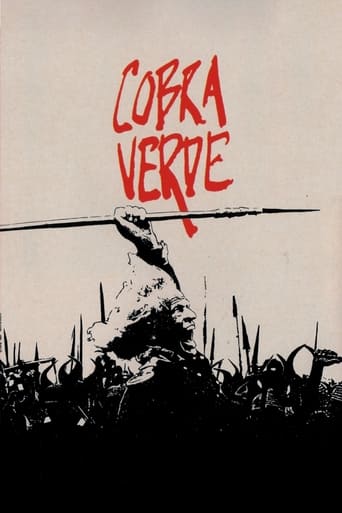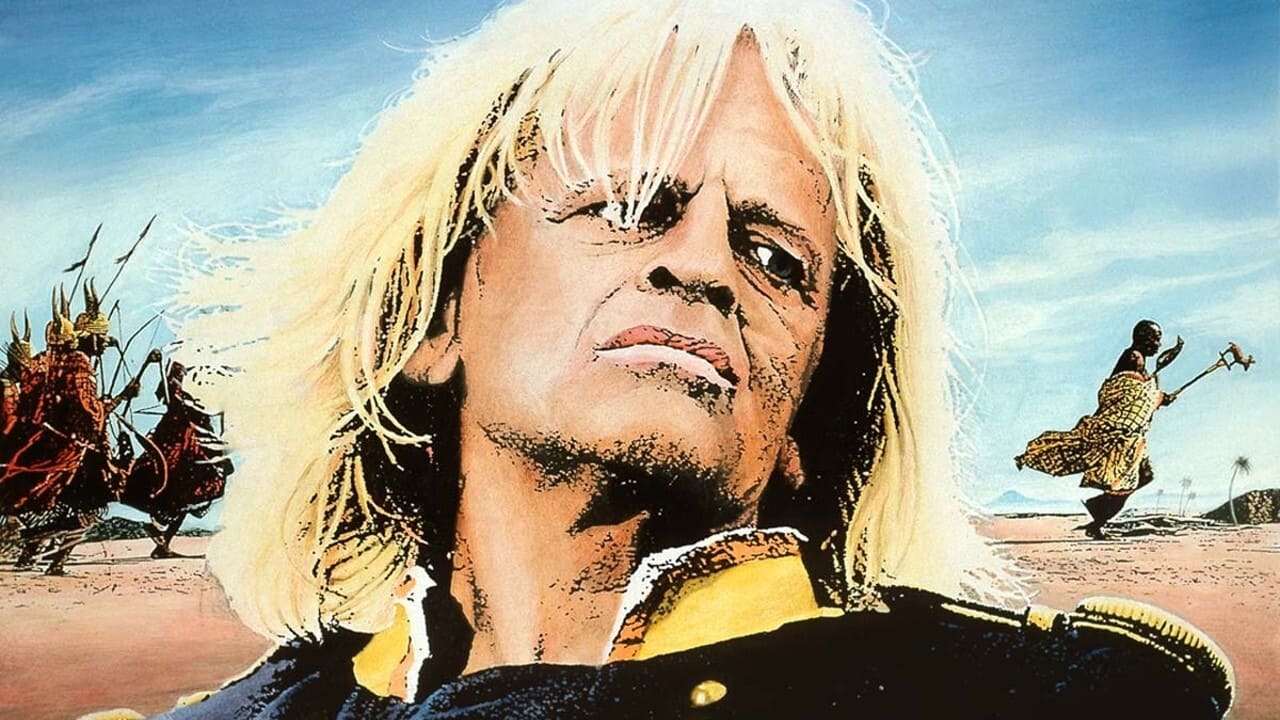Horst in Translation (filmreviews@web.de)
"Cobra Verde" is a collaboration between West German and Ghana from 1987, so this one will have its 30th anniversary next year. The primary language in here is German and director Werner Herzog and Klaus Kinski collaborated here one final time to make this movie. It is not the first film that takes the two to exotic places obviously. The movie runs for 110 minutes approximately and has Kinski play a man who is in charge of supervising slaves, but then he is sent to Africa where he is the only White guy among so so many Black people. Of course, the blonde hair (slightly gray already by then) helps in creating the big contrast in physicality. I cannot say I am familiar with any of the other actors here. Herzog directed of course, but he also wrote the script and for that he adapted Bruce Chatwin's novel. While I love Herzog and Like Kinski, I must say that this film felt a bit like a poor man's version of some of the other work from the duo such as Fitzcarraldo (never been too big on "Aguirre"). The story dragged on quite a few occasions and I must say that overall I did not feel that this was a really exciting movie. Insanity always played a major role, in front of the cameras and certainly also behind the cameras with the volcano that is Klaus Kinski. I would not say that this is a good choice to start getting into Herzog's filmography. I am not at all saying that it was a failure, but it just left me hoping for a better movie and it's far from the best Herzog and Kinski have come up with together. But why would you want to start with this one as it's also a fairly later career effort from Kinski and he was already 60 here. Only 3 Italien films should follow until his death less than five years later. I guess he was probably past peak already for this one too. I don't recommend the watch. Thumbs down.
Red-Barracuda
Cobra Verde is best known as the final collaboration between director Werner Herzog and star actor Klaus Kinski. These two mavericks had come together explosively several times before and, in the process, created some fascinating works of cinema. It was here, however, that the Herzog/Kinski partnership finally and irreparably hit the skids, with Kinski behaving on-set in a manner too negative, even by his alarming standards. This last film is generally considered to be the weakest of the five collaborations and, in fairness, this is not an unreasonable verdict as the plot dynamics and central character are less interesting than in previous films. Having said that, it's still hardly a poor film in a general sense and still has quite a few things about it to recommend.Its story focuses on the 19th century African slave trade. After impregnating all of his plantation boss's daughters, a bandit is sent from Brazil to West Africa to buy slaves in an enterprise his boss fully expects will result in his death. It doesn't quite work out that way and he becomes very involved with an African tribal war instead.Much here is similar to the other Herzog/Kinski films that preceded it. It is set in a historical period, it has a central character who is an outsider with a hint of madness and it features documentary realism in its use of indigenous non-actors in support roles. The location photography is one of the definite strong points and Kinski is always interesting to watch, although in this role he is perhaps more difficult to like than usual; after all he is a slave trader, which is hardly the most sympathetic job title. He and his fellow white men display casual racism throughout, although the film doesn't really much delve into the rights and wrongs of slavery very much and is more a character study of a man in the middle of this scenario. I think the main problem is that the story doesn't really give us much to work with or care too much about. The film, as a result works more in places, with some individual scenes sticking in the mind; most notably for me was the appearance of the 'nuns' – a sequence where several African girls chant and dance in a very captivating manner. There are other interesting moments sprinkled throughout but Cobra Verde somehow doesn't work as well as a whole piece and remains interesting but flawed.
poe426
Francisco da Silva (Klaus Kinski), known as the bandit Cobra Verde, muses wistfully: "I long to go forth from here to another world." Barefoot and penniless, he resorts to robbery whenever the opportunity presents itself and villagers flee at the sight of him. At a slave auction, he intercepts a young slave trying to flee. "Don't run away," he tells the man: "It'll only be worse for you." HOW it could be worse is never really explained, but da Silva's handling of the situation so impresses a sugar plantation owner that he hires da Silva to be his overseer on the spot. Da Silva promptly knocks up the man's three young mulatto daughters. This leads to his "assignment" to an abandoned Brazilian fortress on the West coast of Africa. It's reckoned that he won't survive there because the slave trade is being interrupted on the high seas by British ships and because the Africans themselves have tired of doing (dirty) business with White Men. He begins to amass slaves for shipment, only to find that his shipments are being hijacked by the very men who sent him to the island. He is captured by a tribe of Africans and prepared for execution: his face is painted black (because the Africans "can't kill a White Man") and he's trussed up and delivered to the local King for Final Judgement. He's (obviously) upset: "In this place, the dead are more alive than the living." The night before his execution, he's rescued by rebels led by the "insane" Prince of the same tribe that wants to kill him and is put in charge of training a (topless) female army of "Amazons" to overpower the feckless male tribesmen. (NATIONAL GEOGRAPHIC was never THIS graphic...) COBRA VERDE is an outstanding piece of filmmaking (par for the course for Herzog) and manages to deal with a touchy subject far more effectively than any other movie I've seen about same (slavery). While it's uncomfortable, indeed, to see Kinski leering at some of the (topless) young girls who come out to sing for him, it's well within the bounds of believability. It's one of the Truest moments in the movie, an unabashed look into the Dark Heart of us all. "Slavery is an element of the human heart," Kinski observes: "To our ruin!" The ending, in which a young man horribly disfigured by polio dogs Kinski's heels as he seeks to leave the island, is the perfect denouement.
Cosmoeticadotcom
It is a good film, but not nearly on par with such classics as Aguirre: The Wrath Of God, Nosferatu, Phantom Of The Night, nor Fitzcarraldo, and it is a film even Herzog has expressed dissatisfaction with. The film was written by Herzog, who adapted it from a novel by Bruce Chatwin, The Viceroy Of Ouidah; but it's probably the least affecting screenplay of the major Herzog-Kinski films, as well as the film the two made together that has the least for Kinski to do- i.e- strut his stuff and dominate whole scenes. Things move far too quickly and illogically, there is little explanation of scenes and events, and little in the way of character development, in either the lead character or the few minor characters that say anything. The cinematography is- as usual, excellent, and there are often quotable snippets of dialogue, but, as a whole, the film fails to capture the imagination the way the above named films do. Cobra Verde (the character as written- not Kinski's superb acting) is simply not that compelling a figure, for he has no grand divide within him. He is a brute and a scoundrel, and little more. After this film, Kinski and Herzog had a final falling out, and Kinski died a few years later
. Kinski shows he is a great actor throughout the film. Cobra Verde declares that he does not trust shoes, women, horses, and little else, and has that glower that only Kinski could do. That alone is mesmerizing enough. Had only there been more such moments in this hour and fifty minute film the film may have achieved greatness, but as the main character is never fully realized and the narrative is patchwork- at best, the film is merely a good but uneven work of art. Yet, despite this, a little perspective is needed, for a flawed film by Werner Herzog is significantly better than most any other film a lesser filmmaker will make. By mortal standards, this is not a bad film, at all, but from this great filmmaker and his legendary star- who together left three indisputable masterpieces: Aguirre: The Wrath Of God, Nosferatu, Phantom Of The Night, and Fitzcarraldo, as well as the excellent and enigmatic Woyzeck, it is a bit of a disappointment. Too often it steals the best ideas from earlier and better Herzog films, and never reinvigorates them adequately to suit their inclusion in this film's cosmos. Perhaps it is this knowledge that is behind Herzog's final disappointment with his own film. If so, he is correct in his assessment, and that very awareness is the reason Herzog is such a great artist, for understanding greatness is a deeper and rarer thing than achieving it, for, as I have said, 'Greater than transcendence is its recognition.' Herzog has done both in his career, although only one shall have to suffice in Cobra Verde.



 AD
AD






